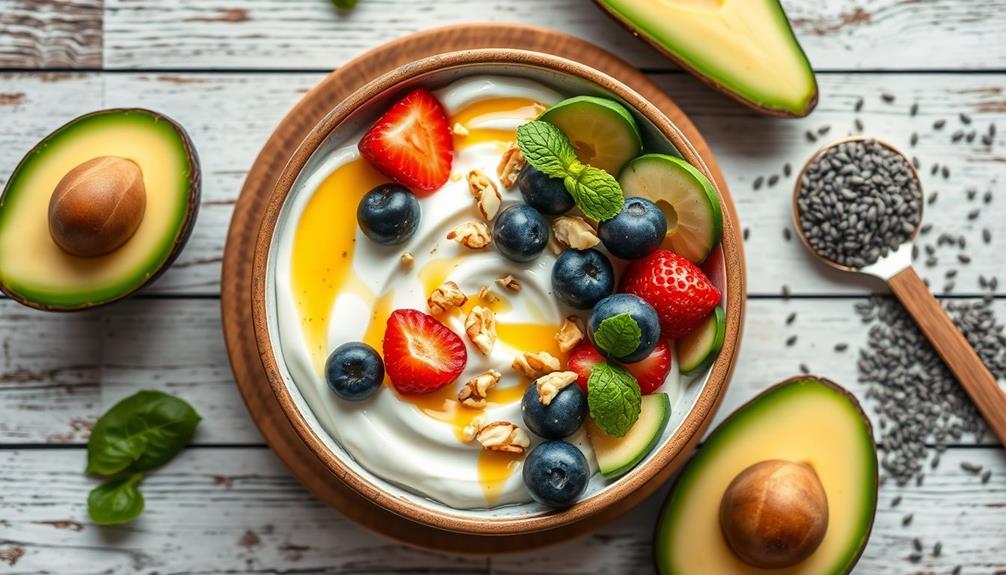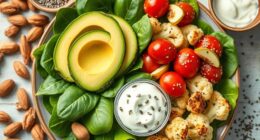Yes, you can have fruit on a keto diet, but it's all about making smart choices. Focus on low-carb options like avocados, berries, and lemons. These fruits offer nutritional benefits without exceeding your carb limits. Portion control is essential, so keep servings small to stay within your daily carb intake of 20-50 grams. Avoid high-carb fruits like bananas and grapes, which can kick you out of ketosis. By being mindful of what you eat, you can enjoy fruits while achieving your keto goals. If you're curious about more tips, there's plenty to explore!
Key Takeaways
- Yes, you can have fruit on a keto diet, but focus on low-carb options like avocados and berries.
- Portion control is essential; limit fruit intake to stay within 20-50 grams of daily carbs.
- High-carb fruits, such as bananas and grapes, should be avoided to maintain ketosis.
- Low-carb fruits provide nutritional benefits without exceeding carbohydrate limits, supporting overall health.
- Consulting a healthcare professional can help tailor fruit intake to your specific dietary needs.
Overview of the Keto Diet
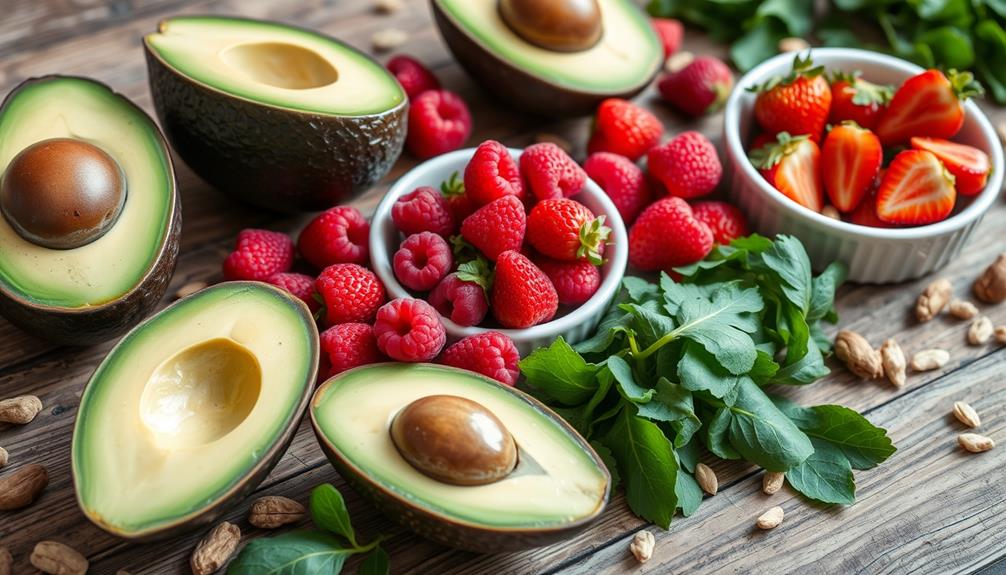
The essence of the Keto Diet lies in its unique approach to nutrition, focusing on high-fat and low-carbohydrate intake. Typically, you'll limit your carbohydrate consumption to around 20-50 grams per day. This restriction helps your body enter a metabolic state known as ketosis, where it begins to burn fat for fuel instead of glucose.
Incorporating foods rich in antioxidants, such as celery juice, can complement this diet by promoting overall health. The diet usually follows a macronutrient ratio of about 70-75% healthy fats, 20-25% protein, and 5-10% carbohydrates. By emphasizing these macronutrients, you can encourage your body to produce ketones, which serve as an alternative energy source. Many people turn to the Keto Diet for its potential benefits, including weight loss and improved metabolic health.
Historically, the Keto Diet has been employed for medical purposes, such as managing epilepsy and diabetes. Currently, ongoing research explores its effects on conditions like cancer and Alzheimer's disease.
However, it's essential to seek dietary advice from a healthcare professional before starting. They can help you navigate the potential side effects and guarantee you maintain the correct macronutrient balance to stay in ketosis.
Low-Carb Fruits to Enjoy
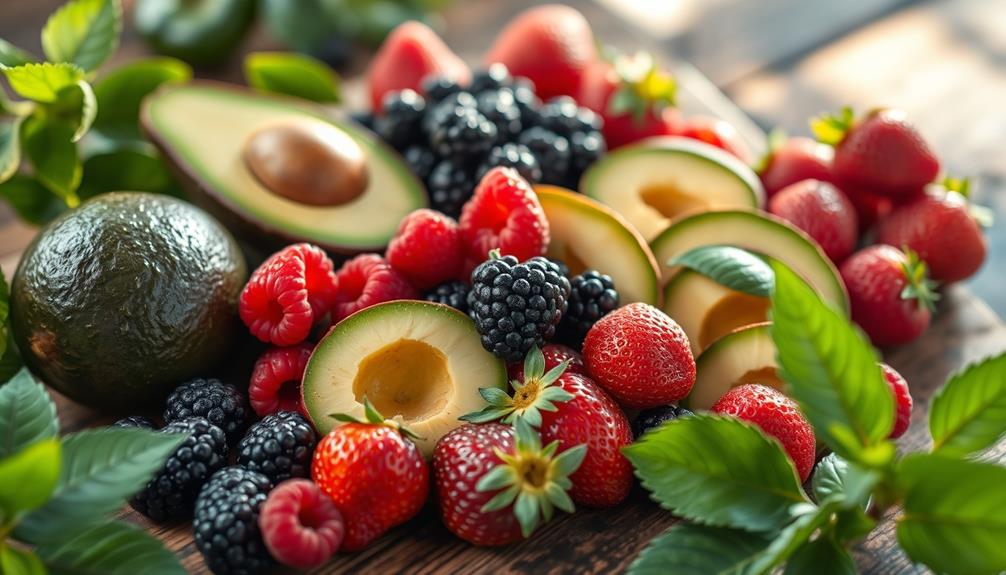
When you're on a keto diet, finding low-carb fruits to enjoy is essential. Options like avocados, berries, and citrus fruits offer great nutritional benefits while keeping your carb intake in check.
Additionally, incorporating these fruits can help support overall health and wellness, as highlighted in effective strategies for weight loss.
Just remember, portion control is important to maintain ketosis, so choose wisely!
Best Low-Carb Options
Explore the delicious world of low-carb fruits that make perfect companions on your keto journey. Incorporating these fruits into your meals can help you stay within your carbohydrate limits while enjoying a variety of flavors and textures. Here are some of the best low-carb options to contemplate:
| Fruit | Carbohydrates (g) | Net Carbs (g) |
|---|---|---|
| Avocado | 8.5 | 1.5 |
| Raspberries | 7 | 7 |
| Blackberries | 7 | 3 |
| Lemon | 5.5 | 4 |
| Watermelon | 11.5 | 11.5 |
| Tomatoes | 7 | 5 |
These fruits not only provide essential vitamins but are also high in fiber, making them great choices for your healthy keto diet. Berries, like raspberries and blackberries, are particularly low in net carbs, while avocados offer a creamy texture and healthy fats. Watermelon can be enjoyed in moderation, giving you hydration and sweetness. Choose these low-carb fruits to eat guilt-free and enjoy the benefits of a keto lifestyle!
Portion Control Importance
Maintaining portion control is essential for a successful keto diet, especially with low-carb fruits. While fruits can offer essential nutrients, they also contain net carbs that contribute to your daily carb intake, which typically ranges from 20 to 50 grams to maintain ketosis.
For instance, one cup of strawberries has about 11.7 grams of carbs per serving. This means you need to be mindful of how much fruit you consume to stay within acceptable carb ranges. Additionally, incorporating essential oils like peppermint oil can provide invigorating benefits that may enhance your overall wellness during your keto journey.
Avocados are an excellent option, boasting only 1.5 grams of net carbs per 100 grams, allowing you to enjoy a generous serving without jeopardizing your keto goals.
Limiting your intake of berries to one cup each day can also help you manage carb intake effectively while still reaping the benefits of essential nutrients and antioxidants.
Monitoring fruit portions is key. Keeping track of your overall carbohydrate consumption can help you incorporate fruit into your meal plans without disrupting ketosis.
Nutritional Benefits Overview
Low-carb fruits can be a delicious and nutritious addition to your keto diet, offering a range of health benefits without derailing your carb count. By focusing on fruits that are low in net carbs, you can enjoy tasty options while staying within your limit of net carbs per day. Incorporating these fruits can also support overall health and wellness, as many of them are rich in vitamins and antioxidants that may help reduce inflammation and support immune function nutritional benefits overview.
Avocados, for instance, are a fantastic choice, with only 1.5 grams of net carbs and nearly 7 grams of fiber per 100-gram serving. They're rich in healthy monounsaturated fats, making them heart-friendly.
Berries, like raspberries, are another excellent option; one cup contains about 7 grams of net carbs and is high in fiber and antioxidants.
Don't overlook tomatoes, which are surprisingly low in net carbs at about 5 grams per cup, while also providing beneficial antioxidants like lycopene.
Lemons add a zesty flavor with about 4 grams of net carbs and a hefty dose of vitamin C to support your immune system.
While watermelon is higher in carbs at 11.5 grams per cup, it's hydrating and packed with vitamins, perfect for a revitalizing treat in moderation.
Enjoy these low-carb fruits to boost your health while sticking to your keto goals!
Nutritional Profiles of Keto Fruits

Keto fruits offer a delicious way to satisfy your sweet cravings while keeping your carbohydrate intake in check. When you consider avocados, they stand out as a high-fat, low-carb option. One 100-gram serving has about 8.5 grams of carbohydrates, but with nearly 6.7 grams of fiber, you only get approximately 1.5 grams of net carbs.
Raspberries are another great choice; one cup contains just 7 grams of net carbs, along with essential vitamins and antioxidants. Additionally, enjoying these fruits can enhance your overall coffee experience, as you might find delightful pairings with your favorite brews, such as an espresso martini for a guilt-free treat unique aroma in homes.
Strawberries are also keto-friendly, with a one-cup serving yielding around 8.7 grams of net carbs and being rich in vitamin C. Tomatoes, often overlooked, have about 5 grams of net carbohydrates in one medium-sized fruit, plus they're high in lycopene and antioxidants.
Finally, don't forget lemons—one small lemon has about 4 grams of net carbs and is loaded with vitamin C, which can aid in hydration and digestion.
Incorporating these fruits into your keto diet can enhance flavor while providing numerous health benefits without compromising your carb limits. Enjoy these tasty options to keep your meals vibrant and nutritious!
Portion Control With Fruits

When it comes to enjoying fruits on a ketogenic diet, portion control plays an essential role in staying within your carb limits. Even low-carb fruits can contribute considerably to your daily carbs. For instance, consuming 1 cup of strawberries adds about 11.7g of carbs to your total.
To maintain ketosis, it's important to limit higher-carb fruits. A peach, for example, has around 15g of carbs, while a cup of cantaloupe contains about 12.7g. Financial mistakes to avoid can also apply here, as overspending on higher-carb fruits can derail your diet efforts.
Focusing on berries is a smart choice, as they offer lower net carbs. You can enjoy up to 1 cup of raspberries, which contains only 7g of net carbs. Avocados are another excellent option; with a recommended serving size of just 1/2 fruit, you'll only take in about 1g of net carbs.
Keep an eye on your overall fruit intake. If you consume 20g of carbs from fruits, you'll have limited room for other foods throughout the day.
Fruits to Avoid on Keto

Avoiding certain fruits is essential for maintaining your ketogenic diet. If you're serious about staying in ketosis, you'll want to steer clear of high-carb fruits that can disrupt your carb intake.
Here are some fruits to avoid:
- Bananas (27g carbohydrates per medium fruit)
- Grapes (17g carbohydrates per cup)
- Cherries (24g sugar per cup)
- Mangoes (22g carbohydrates per cup)
- Dried fruits like raisins and apricots
These fruits are all high in carbohydrates, which can quickly elevate your daily carb intake and kick you out of ketosis.
For instance, banana carbohydrates are particularly high, making it difficult to enjoy them on a keto plan. Similarly, grapes carbohydrates and mango carbohydrates can add up fast, leaving little room for other low-carb options.
Cherries are another fruit you should limit due to their high sugar content. Even dried fruits, often seen as healthy, pack a concentrated sugar punch that can sabotage your efforts.
Health Benefits of Keto Fruits

Incorporating keto-friendly fruits into your diet can offer a range of health benefits while keeping your carbohydrate intake in check. Fruits like avocados and berries are excellent options.
Yoga for back pain can also help alleviate discomfort, making your dietary choices more enjoyable. Avocados have about 8.5 grams of carbs per 100-gram serving, but with nearly 7 grams of fiber, their net carbs are just 1.5 grams. They're rich in healthy monounsaturated fats and potassium, supporting heart health.
Berries, such as strawberries and raspberries, provide antioxidants and are lower in carbs. One cup of raspberries contains approximately 7 grams of net carbs and is packed with essential vitamins and fiber, aiding digestion.
Strawberries offer about 11.7 grams of carbs, yielding a net carb count of around 8.7 grams.
Lemons are another great addition, containing about 6 grams of carbs and boosting your vitamin C intake, which supports your immune system.
Watermelon, while higher in carbs at 11.5 grams per cup, can still fit into your keto diet in moderation, providing hydration and essential vitamins.
Professional Guidance for Keto Diet

Before starting the keto diet, it's essential to consult a healthcare professional or dietitian. They can help you create a personalized dietary strategy that aligns with your health goals and needs.
This guidance guarantees you stay on track while safely incorporating keto-friendly fruits into your meals. Additionally, understanding the key domains of development can aid in recognizing how dietary choices impact overall well-being.
Taking these steps can provide a solid foundation for your journey on the keto diet.
Nutritional Counseling Importance
When starting on the keto diet, seeking nutritional counseling can be a game changer for your success. A registered dietitian can offer personalized dietary advice tailored to your specific needs, helping you avoid potential nutrient deficiencies while meeting your macronutrient goals.
They assess your appropriate carbohydrate intake, usually recommending fewer than 50g of carbs daily to maintain ketosis. Understanding the psychological aspects of dietary changes, including how emotional dysregulation can impact eating habits and food choices, is vital for long-term success, particularly for those with conditions like Borderline Personality Disorder (BPD).
Consider these benefits of nutritional counseling:
- Personalized dietary advice that suits your lifestyle
- Effective incorporation of low-carb fruits, like berries and avocados
- Monitoring of health markers, such as cholesterol levels and kidney function
- Identification of pre-existing health conditions that may pose risks
- Professional guidance throughout your keto journey
Regular check-ins with a registered dietitian not only guarantee you're on track, but they also help you adapt your diet as necessary.
This ongoing support can be invaluable, especially as you navigate the challenges of the keto diet. With the right guidance, you'll be better equipped to thrive on this low-carb lifestyle.
Personalized Dietary Strategies
A personalized dietary strategy can make a significant difference in your success on the keto diet. By consulting a registered dietitian, you can create a tailored meal plan that balances your fruit intake while maintaining the necessary macronutrient ratios for ketosis.
Professionals can guide you on which low-carb fruits, like berries and avocados, to include, ensuring you get adequate nutrition without exceeding carbohydrate limits. Incorporating healthy dog snacks into your dog's diet can also be a great example of how balanced nutrition benefits overall health.
Regular monitoring of health markers, such as blood glucose levels and lipid profiles, is essential for anyone on a keto diet. A dietitian can help interpret these metrics and adjust your dietary strategies accordingly.
They'll assist in identifying your unique dietary needs and any potential nutrient deficiencies that may arise from a restrictive diet like keto, recommending appropriate supplements if necessary.
Personalized dietary strategies not only enhance adherence to the keto diet but also incorporate enjoyable foods, including approved fruits. This approach improves your overall satisfaction and sustainability, making it easier to stick with the diet in the long run.
Embracing a customized plan will help you navigate the complexities of keto while prioritizing your nutrition.
Tips for Maintaining Ketosis
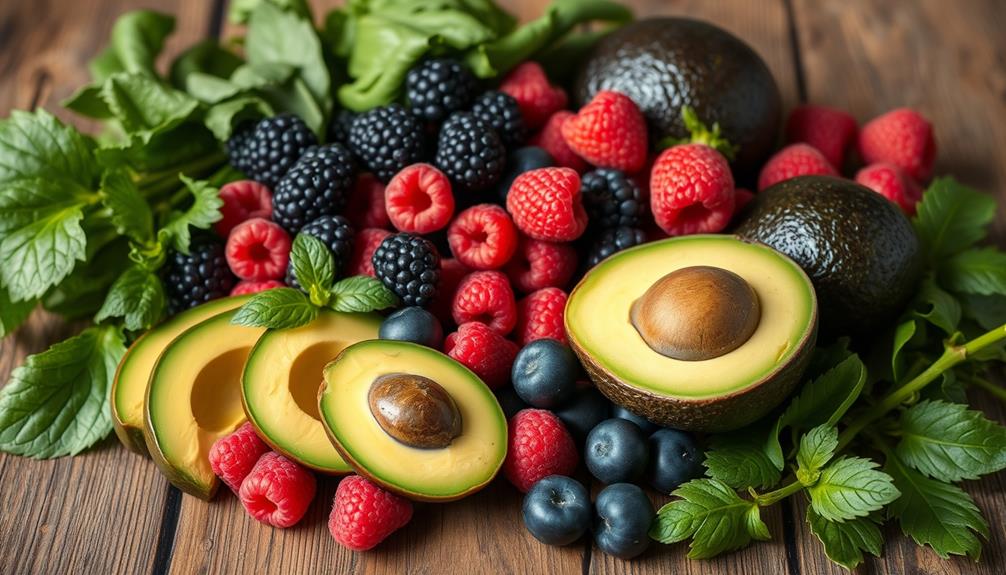
Maintaining ketosis can feel challenging, especially with the temptation of higher-carb foods around. To stay on track, you need to be mindful of your daily carbohydrate intake.
Here are some tips to help you maintain ketosis while enjoying your diet:
- Limit your carbohydrate intake to around 20-50 grams per day.
- Focus on low-carb fruits like avocados, berries, and lemons, which have low net carbs.
- Practice portion size control; for example, stick to 1 cup of berries to manage your carb intake effectively.
- Track your overall carbohydrate intake, including hidden sugars in dressings or sauces.
- Use tracking apps or food diaries to monitor your daily macros, making it easier to identify the carb content of foods.
Frequently Asked Questions
What Fruit Can You Eat on Keto?
You can enjoy low-carb fruits like avocados, berries, and lemons on a keto diet. These options not only keep your carb intake low but also provide essential nutrients and antioxidants for your overall health.
What Fruits Are Not Keto-Friendly?
When considering fruits not keto-friendly, avoid bananas, grapes, mangoes, cherries, and pineapples. Their high carbohydrate content can hinder your progress in maintaining ketosis and sticking to your low-carb goals effectively.
Can I Eat Fruit on Keto and Still Lose Weight?
Sure, you can munch on fruit and still shed pounds! Just steer clear of those sugary devils like bananas. Opt for berries instead—your waistline will thank you while you enjoy nature's candy in moderation!
Can I Eat an Apple on Keto?
You can't eat an apple freely on keto. With about 20-30 grams of net carbs, an apple could push you over your daily limit. Consider lower-carb fruits instead, like berries or avocados, for better results.
Conclusion
Incorporating fruit into your keto diet can be both enjoyable and beneficial if you choose wisely. By focusing on low-carb options and practicing portion control, you can savor the flavors without derailing your progress. Isn't it amazing how you can still indulge in nature's sweets while staying on track? Remember, balance is key, so listen to your body and adjust as needed. With the right approach, you can thrive on keto and still enjoy the occasional fruity treat.




